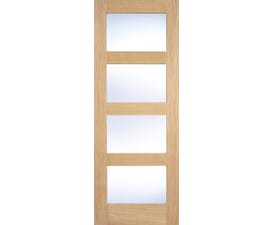 Climadoor
Climadoor
Victorian 4 Panel Shaker Oak Frosted Glass Sliding Barn Door
From £195.99 inc VAT.
£163.33 ex VAT
Rustic Solid Oak Ledged & Braced Sliding Barn Door
From £241.99 inc VAT.
£201.66 ex VAT
Traditional Victorian Clear Pine 2 Panel Door
From £66.59 inc VAT.
£55.49 ex VAT
Traditional Victorian Clear Pine 4 Panel Door
From £66.59 inc VAT.
£55.49 ex VAT
Traditional Victorian Clear Pine 4 Panel Glazed Door
From £85.49 inc VAT.
£71.24 ex VAT
Shaker 4 Light Clear Glazed Oak Unfinished Door
From £136.00 inc VAT.
£113.33 ex VAT
Unfinished interior doors are essentially what their name suggests: doors that haven’t been finalised with paint, varnish, or stain. These doors are usually made of timber, giving homeowners the freedom to finish them in any way they like. Whether one wants a natural wood appearance, a painted look, or even a vintage patina, the options are virtually endless. Find out when to choose unfinished doors in our detailed blog post.
Unfinished doors can be integrated into various design themes:
An unfinished interior door is not just a functional element; it's a canvas waiting to be transformed. By choosing to finish a door oneself, homeowners can put a personal touch on a room, making the space truly reflective of their style and taste. Whether it’s bold, understated, or something in between, un-finished doors offer a world of design possibilities. For more guidance on finishing, check out our article on Painting Internal Doors.
Questions about Unfinished Internal Doors
An unfinished door is a door that has not been treated with a final finish such as paint, varnish, or stain. It typically retains the natural appearance of the wood and provides homeowners the opportunity to customise its look according to their preferences.
Unfinished doors offer greater flexibility in terms of customisation. They allow homeowners to select their own finish to perfectly match their interiors. Additionally, unfinished interior doors can often be more cost-effective than pre-finished versions.
Since they lack a protective finish, unfinished interior doors can be more vulnerable to moisture, scratches, and dings. However, once they're treated with a proper finish, they will have similar resilience as pre-finished doors.
It's best to finish your door as soon as possible, especially if it's exposed to high humidity or fluctuating temperatures. This helps prevent warping, swelling, or potential damage to the wood.
The best finish depends on the desired appearance and the room's function. For a natural look, clear varnish or sealant works well. For colour, homeowners can choose between paints and stains, considering the wood type and desired look.
Start by sanding the door to create a smooth surface. Wipe it down with a damp cloth to remove dust. Depending on the finish you're using, you might need a primer. Always follow manufacturer recommendations for the best results.
Often, unfinished doors are priced lower than their pre-finished counterparts. However, one should factor in the cost of finishing materials and the time or labor required to complete the door when determining overall value.
Technically, yes. However, it's not recommended as the door will lack protection against wear and tear. To ensure longevity and aesthetic appeal, always finish your door before or shortly after installation.
The Different Types of Internal Doors
Buying your doors used to be relatively straightforward, but as demand for different styles, sizes, colours, designs, and types of door has increased, so has the number of choices....
How To Prevent Internal Doors From Sticking
Do you have an internal door that gets stuck all the time? If so, you’re far from alone - it’s a very common problem. Maybe your door catches at the top, or s...
Is It Easy to Replace Internal Doors?
If you're doing renovations, one way to make an instant impact is to replace your doors. It's easy to underestimate the difference that an internal door can make but one that is sh...
 Climadoor
Climadoor
 Climadoor
Climadoor
 Climadoor
Climadoor
 Climadoor
Climadoor
 LPD Doors
LPD Doors


